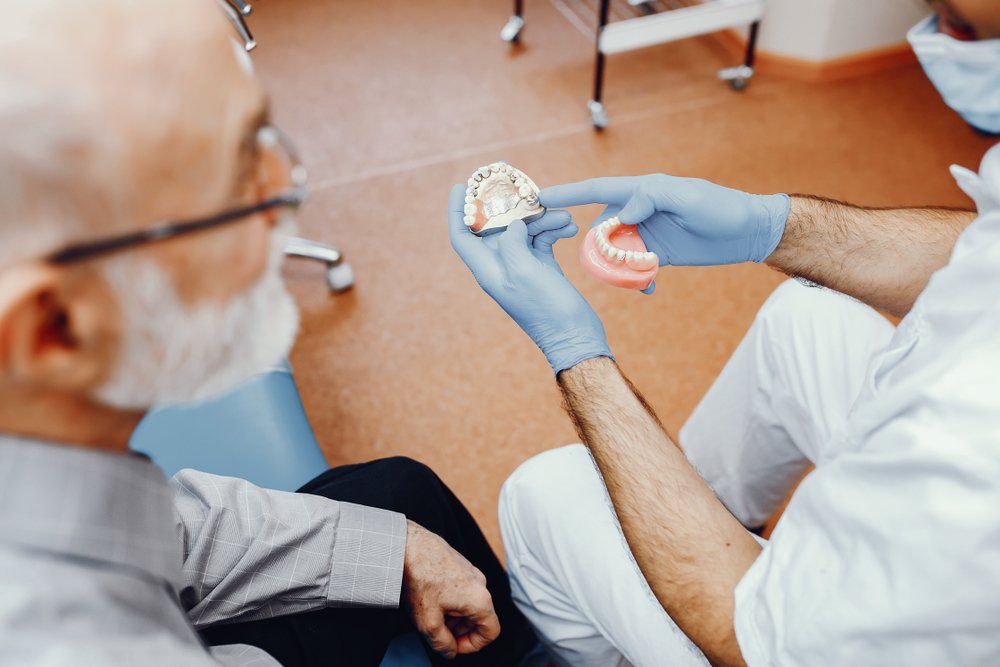Denture relining is an essential step in maintaining the fit and comfort of your dentures over time. After your initial set of dentures, your gums and jawbone may naturally change, making it necessary to adjust the denture base. The first denture reline is a key milestone in ensuring your dentures remain functional and comfortable.
In this article, we’ll cover what a denture reline is, why it’s important, what to expect during your first reline, and tips for maintaining your dentures.
What Is a Denture Reline?
A denture reline is the process of adjusting the inner surface of your dentures to better fit your gums. Over time, your gums and jawbone may shrink or change shape due to:
- Natural bone resorption
- Weight loss
- Aging
- Tooth extractions
These changes can cause dentures to feel loose or uncomfortable. A reline involves adding material to the base of the denture to improve its fit and restore comfort.
Why Is the First Denture Reline Important?
The first reline is typically required within the first six months to a year after getting new dentures. During this time, significant changes in the shape of your gums and jawbone are common as your mouth adjusts to being without natural teeth. Without a reline, ill-fitting dentures can cause:
- Irritation or sores on the gums
- Difficulty eating or speaking
- Increased risk of denture breakage
- Bone loss due to uneven pressure
A reline ensures that your dentures continue to provide proper support and function while reducing discomfort.
Types of Denture Relines
There are two primary types of denture relines:
1. Soft Reline
A soft reline involves using a pliable, cushion-like material. It’s ideal for patients with sensitive gums or those experiencing significant discomfort. Soft relines are often the choice for first-time adjustments since they are gentler on the gums.
2. Hard Reline
A hard reline uses more durable acrylic material to reshape the denture base. This option provides a longer-lasting fit but may take longer to adjust to compared to a soft reline.
Your dentist will recommend the best type of reline based on your individual needs.
What to Expect During Your First Denture Reline
1. Evaluation
Your dentist will examine your gums and dentures to determine the extent of the adjustment needed.
2. Impression
An impression of your mouth may be taken to ensure the reline material conforms precisely to your gum shape.
3. Application
The reline material is applied to the inner surface of the denture and adjusted for a snug fit. For soft relines, the process may be completed in the dentist’s office. For hard relines, your dentures may be sent to a dental lab for fabrication, requiring a few days.
4. Fit and Comfort Check
Once the relining process is complete, your dentist will check the fit and make any necessary adjustments.
Benefits of a Denture Reline
1. Improved Comfort
Relining eliminates pressure points and ensures an even fit, reducing irritation and soreness.
2. Better Functionality
Well-fitted dentures make it easier to chew, speak, and smile with confidence.
3. Extended Denture Lifespan
Relining helps maintain the integrity of your dentures, preventing premature wear or damage.
4. Cost-Effective Solution
Relining is more affordable than replacing dentures entirely, making it a practical way to extend their usability.
How Often Should Dentures Be Relined?
After your first reline, regular relines are recommended every 1–2 years, depending on changes in your mouth and the condition of your dentures. However, if you notice the following issues, consult your dentist sooner:
- Loose-fitting dentures
- Gum irritation or sores
- Difficulty chewing or speaking
- Frequent slipping or movement
Caring for Relined Dentures
To maintain the fit and longevity of your relined dentures, follow these tips:
- Clean your dentures daily using a soft denture brush and mild cleanser.
- Avoid using abrasive toothpaste or hot water, which can damage the material.
- Soak your dentures in a denture solution to keep them moist and fresh.
- Handle dentures carefully to prevent cracks or breaks.
- Schedule regular dental checkups to monitor your oral health and denture fit.
Richmond Hill Smile Centre: Your Trusted Partner in Emergency Dental Care
When a dental emergency strikes in Richmond Hill, Richmond Hill Smile Centre is the clinic you can rely on for top-tier care. Conveniently located at 10157 Yonge St Unit 101, Richmond Hill, ON L4C 1T6, Richmond Hill Smile Centre is known for its prompt, compassionate, and expert handling of dental emergencies. Whether you’re dealing with a severe toothache, a broken tooth, or another urgent dental issue, the skilled team at Richmond Hill Smile Centre is ready to assist you.
Contact Richmond Hill Smile Centre at +1 647-362-4755 or via email at info@richmondhillsmilecentre.ca to receive the immediate care you need. Their dedicated team is committed to providing quick and effective treatment to alleviate pain and protect your dental health.
Frequently Asked Questions (FAQs) About First Denture Relines
1. How long does the relining process take?
A soft reline can often be completed in a single dental visit, while a hard reline may require your dentures to be sent to a lab, taking a few days to a week.
2. Is a denture reline painful?
No, a reline is not painful. In fact, it can alleviate discomfort caused by ill-fitting dentures. Your dentist will ensure the process is as comfortable as possible.
3. How much does a denture reline cost?
The cost varies depending on the type of reline (soft or hard) and your dentist. It is generally more affordable than replacing dentures.
4. Can I reline my dentures at home?
DIY denture reline kits are available, but they are not a substitute for professional care. Improper application can cause more harm than good, so it’s best to see your dentist.
5. What happens if I don’t get my dentures relined?
Ignoring the need for a reline can lead to discomfort, gum irritation, bone loss, and decreased functionality of your dentures. Over time, it may even necessitate a complete denture replacement.
Conclusion
The first denture reline is a vital step in maintaining the comfort and functionality of your dentures. As your gums and jawbone adjust, relining ensures a snug fit, reducing irritation and improving your overall oral health.
Whether you need a soft or hard reline, consulting your dentist early can prevent long-term complications and extend the lifespan of your dentures. Regular care, follow-ups, and relining as needed will help you enjoy a confident and comfortable smile for years to come.



